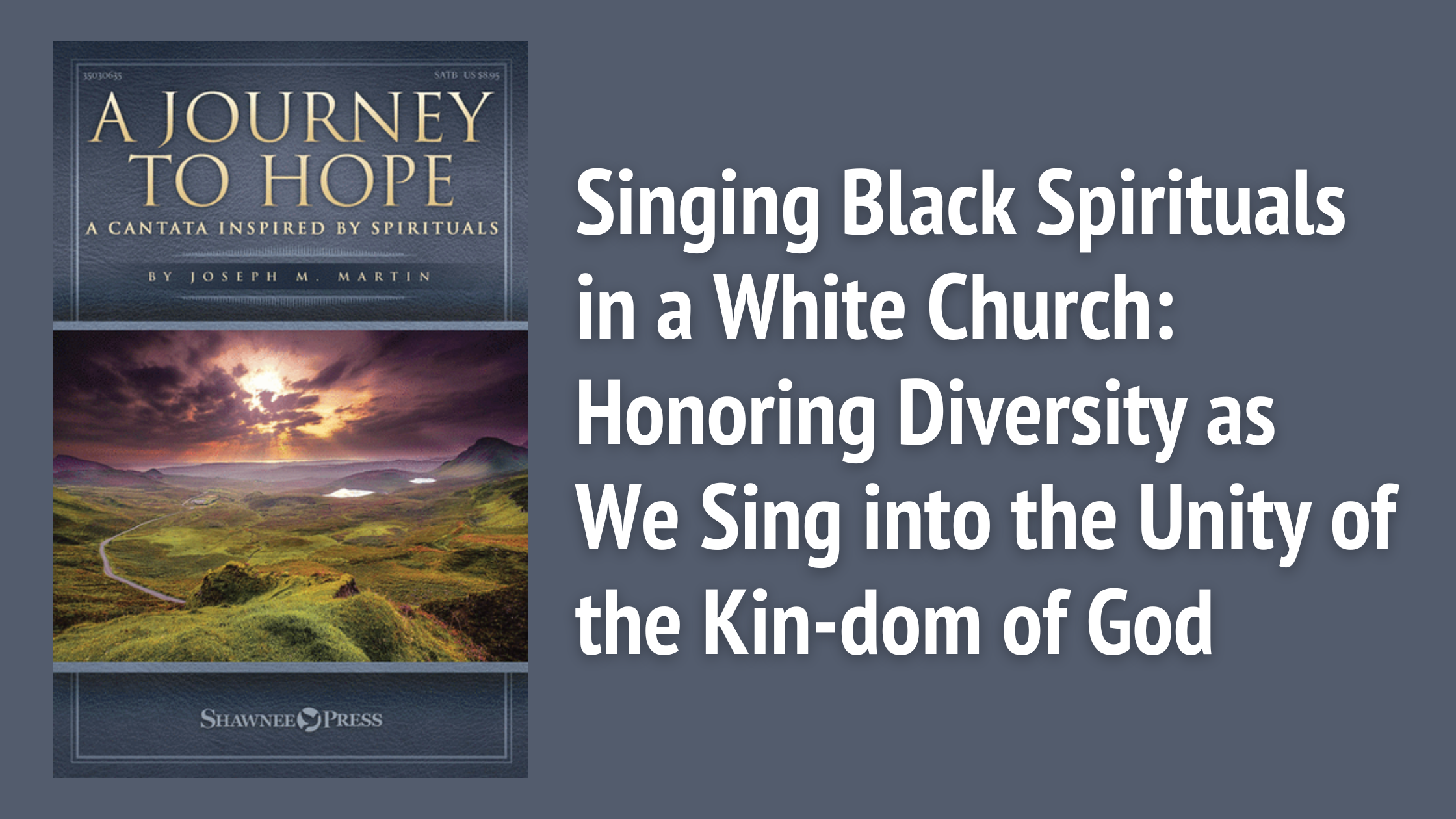
By Christian McIvor
We look forward to seeing you in Sunday morning worship on April 7 for this year’s Easter cantata! The full title of the work, which was composed by Joseph Martin, is A Journey to Hope (A Cantata Inspired by Spirituals). Throughout the cantata, Martin weaves together original material with lyrics and musical themes from 16 different spirituals. 14 of the 16 spirituals included in the work come out of the Black tradition, and this has led our choir to have some discussions about what exactly it means for us to sing Black Spirituals in a predominantly white church.
I hope you have noticed by now that I believe it’s extremely valuable and important to include diverse musical styles, songs, and traditions in worship. Back in the fall of 2021, I shared many of the reasons why I feel that way in a 3-part “Music of Our Faith” series. Throughout the course of that series, I shared with you Dr. C. Michael Hawn’s concept of the “Seven Streams of Congregational Songs,” a way of classifying congregational songs according to the particular sources of faith from which they arose. It is a concept I keep at the forefront of my mind when selecting music for worship, as meaning is made and identity is formed through music – we are and we become what we sing. Therefore, I believe we should sing broadly in worship as a way of honoring and celebrating the diversity that is present in the body of Christ and the human experience, and also as an embodied way of living into the unity of the kin-dom of God.
While I hope that this comes across in worship and that the music we sing helps all of us to behold the beauty in God’s diversity, I also want to be sure that we are singing music from various traditions in a way that expresses cultural appreciation and not cultural appropriation. Anti-Racism Daily defines cultural appropriation as “the act of taking elements of a marginalized culture and using them without proper understanding or respect for their original context or significance,” while cultural appreciation is “the act of showing interest in, respect for, and understanding of a culture or cultural practices.” With that in mind and as a result of the discussions we’ve had in the choir, I’ve put together the following list of spirituals that are included in our cantata. Each numbered selection is the title of a song in the cantata and underneath each numbered selection are the titles of the spirituals included within it. They are labeled as to the traditions from which they arose and each link leads to an informational article/website. While I looked to center Black voices wherever possible, Dr. Hawn’s History of Hymns series (where most of the links lead) is a reliable source with an abundance of information and he is mindful of centering Black voices in his own writing. Below the list of spirituals, additional resources are included that provide some further general information about and reflection upon Black spirituals.
I hope you will enjoy learning about these spirituals and that we’ll all gain a deeper understanding of and appreciation for the significance of this music. Brainerd Blyden-Taylor (Founder, Artistic Director and conductor of The Nathaniel Dett Chorale, Canada’s first professional chamber choir dedicated to the creation and performance of Afrocentric music of all styles), says, “I think that Spirituals have transcended their original creation. Whether you’re Black or white or anything else, if you’re respectful of where this music came from and you open yourself to receive the uncomfortable, unsettling emotions that arise when you sing the Spiritual, it changes the way you are in the world.” As we learn about, listen to, and sing this music, let it change us so that we might become ever more authentic agents of justice, reconciliation, and compassion in the world as faithful expressions of God’s expansive love.
- The Call to Faith
- “Come Ye Sinners, Poor and Needy” (white – English Calvinist (text), camp meeting spiritual (tune))
- “Wade in the Water” (Black)
- The Call to Follow
- “I Want Jesus to Walk with Me” (unknown, likely Black)
- “I Have Decided to Follow Jesus” (Indian)
- “Give Me Jesus” (Black)
- Peace for the Journey
- “We Shall Walk Through the Valley in Peace” (Black)
- “There Is a Balm in Gilead” (Black)
- Ride On, King Jesus
- “Ride On, King Jesus” (Black)
- Come to the Welcome Table
- “I’m Gonna Sit at the Welcome Table” (Black)
- “Let Us Break Bread Together” (Black)
- Gethsemane
- MARY WAS THE QUEEN OF GALILEE (unable to find information, likely Black)
- Jesus Walked to Calvary
- “Calvary” (Black)
- They Crucified My Lord
- “He Never Said a Mumblin’ Word” (Black)
- Great Day! The Lord Is Risen!
- “Great Day!” (Black)
- “Somebody’s Knocking” (Black)
- “My Lord, What a Morning” (Black)
Additional Resources:
- African-American Spirituals (Library of Congress Article)
- History of the American Negro Spiritual (National Association of Teachers of Singing)
- Spirituals Are the Songs of Slavery – Here’s Why It Matters Who Sings Them (CBC Arts)
- The Negro Spiritual: From Cotton Field to Concert Hall (Randye Jones)
- Why we capitalize ‘Black” (and not ‘white’) (Columbia Journalism Review)